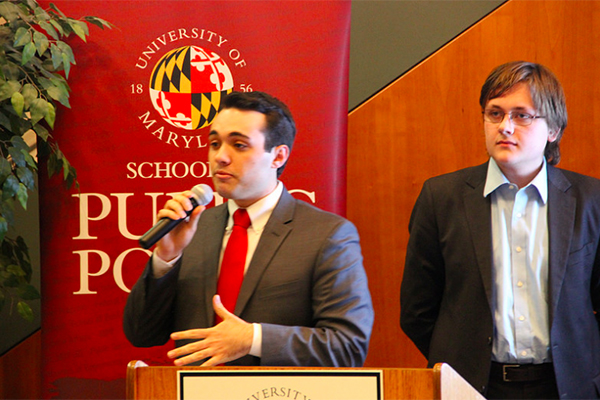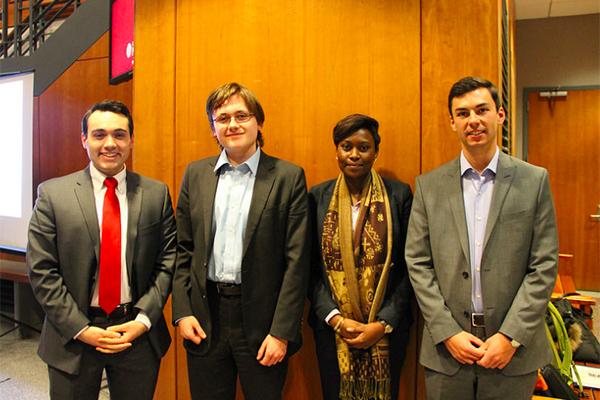National champ
MPA student on winning team in national health policy competition
10:15 a.m., March 9, 2015--University of Delaware graduate student Mark Rucci was a member of a team that won a national health policy competition sponsored by the Network of Schools of Public Policy, Affairs, and Administration (NASPAA).
Forty-five teams of students representing 93 schools came together Feb. 28 at five regional host sites across the United States to participate in the NASPAA Student Simulation Competition. The student teams were challenged to examine health care reform and present a locally-led, “bottom up” approach to the issue.
Honors Stories
National Medal of Science
Warren Award
Rucci, a 4+1 student in the master of public administration (MPA) program in UD’s School of Public Policy and Administration (SPPA), competed on a team that won not only the national capital regional competition but was also selected by a panel of experts in the field as the national winner.
In addition to Rucci, the winning team included the following graduate students:
- Nomzana Augustin, Zanvyl Krieger School of Arts and Sciences at the Johns Hopkins University;
- Zachary Blackburn, Frank Batten School of Leadership and Public Policy at the University of Virginia; and
- Christophe Combemale, Heinz College at Carnegie Mellon University.
In total, the 45 competing teams investigated more than 4,400 health care futures that were compared in a simulator to a control base that predicted what would happen in the future if it was assumed that no changes were made to today’s health care system.
The winning teammates demonstrated masterful knowledge of health care challenges and concerns surrounding current policy, according to a representative of the competition. They used sophisticated reasoning to develop complex policies that would provide significant, long-term health care improvements and have realistic potential to be implemented in our politically charged world.
The students made sophisticated tradeoffs in their policy design that would allow their policies to be both organizationally and politically feasible.
The winning students designed a hypothetical scenario that would fix bottlenecks in the system, balance public and private funding, and create solvent hospitals. The carefully sequenced strategy included paying health care providers based on value, instead of volume, of services, coupled with investments that would support self-care, establish medical homes, coordinate care to cut costs, and reinvest gains to encourage healthier behaviors and create realistic pathways for those in poverty.
If this strategy were scaled and implemented in regions across the country, it could:
- Save the U.S. $640 billion dollars annually in 2040;
- Cumulatively save approximately $8.6 trillion U.S. dollars between 2015 and 2040;
- Yield $743 billion U.S. dollars in increased productivity in 2040 (due to fewer sick days taken)
- Decrease death rates by 20.2 percent;
- Decrease emergency room visits dropped by 22.1 percent; and
- Drop high risk behaviors such as obesity, smoking and drug abuse by 50 percent by 2040.
Rucci said he is thrilled that his team won the competition, grateful for the opportunity to represent SPPA and UD on a national level, and proud of his team’s work in the challenge.
“As UD makes more moves to focus on interdisciplinary, problem-based learning, I feel that my success at the NASPAA competition is a product of that approach,” Rucci said. “Having had the opportunity to attempt to improve health outcomes through public policy with students from around the world and at major universities was rewarding and realistic.”
He added, “It was an honor for our team to be named the capital region winner, but the announcement as the national champion was truly humbling for us. We hope that this award will highlight the importance of supporting public policy at universities across the country as a true pillar of social entrepreneurship.”
The simulator used in the competition is a state-of -the-art policy planning tool developed by the Rippel Foundation as part of its ReThink Health initiative, and is based on extensive research and widespread engagement with communities.
The ReThink Health Model has been used to support ambitious health reform efforts in cities that include Atlanta, Cincinnati and Pueblo, Colorado.












